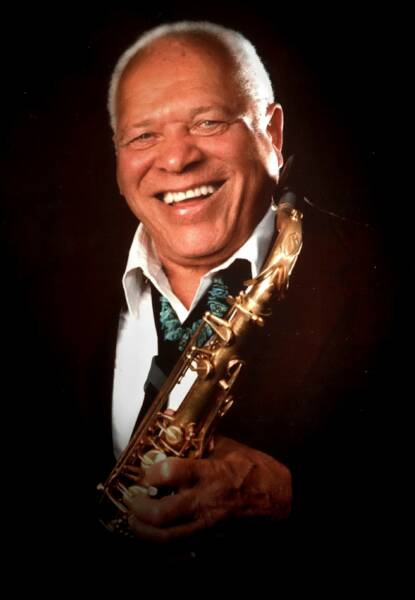Dowagiac Daily News
October 23, 2007
Franz Jackson Day
By JOHN EBY / Dowagiac Daily News
Tuesday, October 23, 2007 10:26 AM EDT
"That's one of the reasons for this gala, is for people who don't know a lot about him to hear him and for him to get back all the joy he's given out to other people," says Franz Jackson's daughter, Michelle Jewell of Niles. "Not only does his musicality touch people, his humanity and the way he treated people was even more profound, which is an incredible gift.
"He had an opportunity to play with Louis Armstrong, but to hear my dad tell it, he didn't want to because he considered him a showman, a stage hog, if you will.
"If Louis was performing, nobody else was supposed to jump out there and try to do their thing. It was all about him. Dad wasn't like that. He much preferred playing with Roy Eldridge, who included the entire band.
"I remember meeting Dizzy Gillespie. That was the cool thing about being his daughter. I met so many famous people that, now, looking back, I was too young to appreciate, but I met Ella Fitzgerald and Dizzy Gillespie. Roy Eldridge used to come over to the apartment and hang out."
Jackson "judges a performance by audience reaction," according to Jewell. "If he has pleased the audience, he's cool. He absolutely enjoys what he's doing, but he does it to make somebody else happy. He likes to tell a story with his music and gets very annoyed listening to modern day musicians who 'just blow notes. There's no melody or flow, just who can play the most notes' the loudest, the longest and the highest. That's not jazz or what it started out to be."
Jazz "started out as party music," Jewell said. "You played it in a club while people danced and talked and had a good time. The music was a backdrop to that. Now, I think, people tend to go to a jazz club and sip a martini" as they "analyze" this "cerebral" sound.
Jackson, who "hired and fired" Miles Davis in New York, wrote a number of his own tunes.
Four compositions appear on a CD Jackson recorded with the Salty Dogs.
Jewell said in the late 1940s Jackson made his first USO tour to the Pacific.
"He ended up in Sweden, where the tour ended. He had married his first wife, who was a singer, and wanted to stop touring and spend some time with her. He played in a band in a hotel. They spent a year in Sweden, went to New York for 10 years and returned to Chicago.
"His most extensive USO shows came in the late 1960s and early '70s because I remember him being overseas and sending back movies of Vietnam. He was fascinated with people and took hours of home movie footage. I put a collection on videotape for their 30th anniversary."
Jewell said the Swedish hotel management didn't think the light-skinned Jackson was "black enough" to be a real jazz man, so pictured a darker-skinned African American on the marquee next to his wife's, even though he was playing inside. "That hurt me," Jackson confided to his family.
"He has lots of stories about the gangster era" since he was active in Chicago at the same time as Al Capone. "In fact, he was on that Geraldo special when Geraldo opened the vault. They interviewed him because he used to play at Al Capone's places," Jewell said.
"Some of the racial things he went through" were as segregated as the color line which divided the major leagues from the Negro leagues pre-Jackie Robinson.
"I played at the same time" as prominent white musicians, "but there was a white band and a black band," Jackson told his family. "The white guys did their thing, then at intermission, they'd roll the white band off and roll the black band on. We never crossed paths" except "they were in the same realm, at the same talent level," Michelle said. "I know a lot artists who prefer to live in Europe, which has been more progressive than the United States for a long time in terms of race relations."
Besides his main weapon, tenor sax, Jackson's "arsenal" included clarinet and soprano sax. For 10 years at the Red Arrow, a nighclub in Berwyn, Ill., he didn't play tenor at all, which seems unthinkable, but he focused on clarinet. He can play flute, taught himself guitar, plays piano and played first bassoon with the DePaul Symphony for 14 years "because he wanted to see what it was like to play classical music." He played command performances three years for the king of Sweden and in Israel.
Jackson's day-to-day life is "boring," his daughter said, "because he'd much rather be playing five nights a week, even though he's tired when he's done with a three-hour set at Wood Fire. He goes out to the Council on Aging. He drove until he was 92. He's still mad as hell his driver's license was taken from him. His mother lived to be 90. His sister lived into her 80s. My mom lived to be 86. Some of his health problems are directly the result of all that second-hand smoke" he breathed in clubs.
"He gave up smoking when he was a teen-ager so he could play," she said, "and he never was a drinker, except socially, with his fans. His philosophy has always been, personally and professionally, 'Everything in moderation.' Don't overdo or underdo exercise, food, wine, beer, whatever it is. Stay in the middle of the road. If it ever comes to the point where my dad cannot pick up his horn and play, he'll be gone very soon. Why stick around? That's what's been in his heart his whole life. He tears up when he hears his old Red Arrow CDs because he'll say, 'None of them are around anymore.' "
